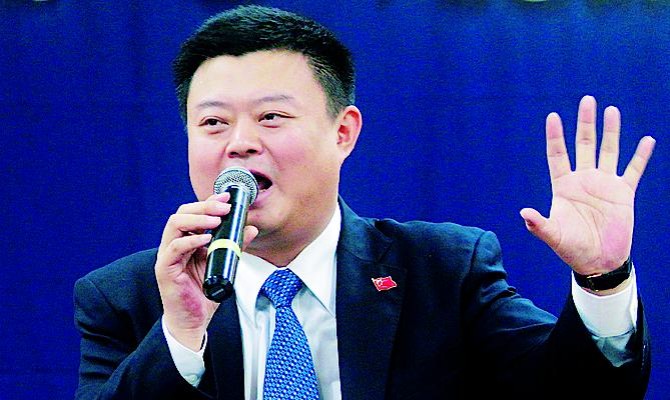Technology
projectsChina wants to launch a 4G network for the needs of the government of Ukraine

A press conference organized by Chinese billionaire Wang Jing, who was expected to tell attendees why he would invest US $600 mn into the creation of a national 4G network, was scheduled to take place on July 15. The conference did not take place as the businessman had to urgently return home. Later, a short interview appeared on the website of UkrInform, where Jing spoke about the national significance of the project. “This (the project – Capital) will give the government of Ukraine a possibility to improve the level of services provided and will make communication in everyday life simpler for ordinary people,” he said.
Transport for electronic government
“The government plans to support the Chinese project as an alternative to the three major mobile networks,” a source in the National Communications and Informatization Regulatory Commission told Capital. Another interlocutor of the newspaper added that the Chinese side has already held a meeting with the Cabinet of Ministers of Ukraine. “They are proposing to create a protected network for the government, but insist that Ukraine undertakes the responsibility and has a 20% stake in the project,” said the interlocutor.
Head of the NCIRC Volodymyr Zverev informed Capital that recently the Ministry of Regional Development requested information about the Xinwei Company from the regulator. “We collected all available information and responded to the request. If there is interest in information, then there is a certain process under way,” says Zverev.
Noteworthy is that the Minister of Regional Development, Construction and Housing Utilities Volodymyr Groisman is planning to create a National Electronic Government Agency in Ukraine. A high-speed telecom infrastructure is required to support the functioning of such an agency.
In an interview for UkrInform Jing mentions that his company Xinwei will be developing the project with a Ukrainian partner. Capital learned that Xinwai has started parallel talks with Datagroup (Oleksandr Kardakov), an infrastructure that the Chinese will be able to use in the future. Datagroup has a branched-out grounded and high-speed fiber-optic network and a radio frequency license within the range of 1.5 GHz for wireless data transfer. Yesterday, General Director of Datagroup Oleksandr Danchenko did not confirm or deny that such talks were held. “I cannot comment on this,” he said.
Second attempt
Interestingly, this is not the first time that Xinwei is planning to launch operation on the Ukrainian market. Last year, information appeared that Xinwei became an owner of the Ukrainian operator ProSAT, which has a national license for 1.8 GHz. The Chinese wanted to take their own standard McWiLL, which they call 4G, as the basis for providing services. In the fall, the local management drafted the initial business plan. The Chinese announced at the end of 2013 that investments into the network will be US $1.4 bn. The company had plans to begin the development of the network this year and complete it in 2016.
The Chinese believed that on the basis of the new infrastructure they would successfully develop a system of information provision under the Ministry of Emergencies, as well as distance learning, distance medicine and Internet gadgets for subscribers in the Ukrainian government and high-speed Internet access for private users. However, as a source in ProSAT told Capital development of the project slowed down due to the aggravated situation in Ukraine. Wan Jing visited Ukraine to see for himself that everything is normal.
Noteworthy, recently the NCIRC also allowed the use of the first subscriber device manufactured by Xinwei in Ukraine. Capital’s interlocutor said that later it will be a line of devices operating both in the McWill and GSM networks. By the way, Xinwei is not only a telecom operator, but primarily a manufacturer of telecom equipment and gadgets (mobile phones, smartphones and tablets).
Forget about security
“The network of government communication must be reinforced and this is a good idea. The other thing is that it requires substantial investments and a comprehensive approach,” says Danchenko. He believes that first of all a national plan of broadband Internet access must be developed, i.e. a roadmap of Internet services and technology development.
Danchenko estimated that the cost of construction of a high-speed network is approximately US $50 mn. “However, in the end everything depends on the national strategy,” he adds. Director of the Ukrainian Network Information Center Yuriy Honcharuk also agrees with these estimates and reminds that the government already tried to set up a national system of confidential communication, but never managed to allocate sufficient funding for the project. “The cost of the network of government communication is upwards several millions of dollars. A very small amount was allocated for these purposes: only around US $8 mn, which is part of the money received from the sale of UMC in 2007,” says Honcharuk.
He says the current legislative base allows for providing commercial services on the basis of this network. “For instance the service of confidential communication for business is very popular in the U.S. It ensures higher protection compared to ordinary networks against tapping and interference,” he says. Another interlocutor of Capital, however, believes the format of cooperation, when a foreign company basically controls the network of government services and has full access to it, is absurd. “This can easily lead to a leak of important information,” he summed up.







 of the agreement of syndication with Financial Times Limited are strictly prohibited. Use of materials which refers to France-Presse, Reuters, Interfax-Ukraine, Ukrainian News, UNIAN agencies is strictly prohibited. Materials marked
of the agreement of syndication with Financial Times Limited are strictly prohibited. Use of materials which refers to France-Presse, Reuters, Interfax-Ukraine, Ukrainian News, UNIAN agencies is strictly prohibited. Materials marked  are published as advertisements.
are published as advertisements.